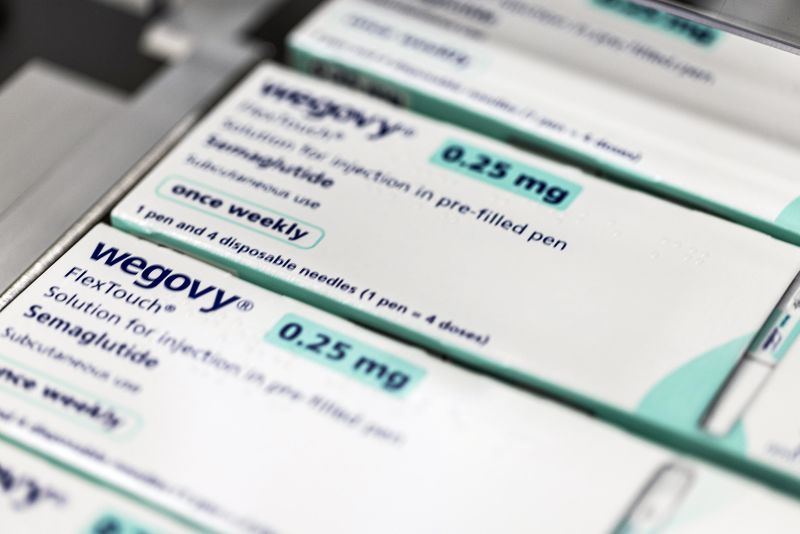
Semaglutide drugs such as Wegovy and Ozempic are seeing a surge in prescriptions, leading to an influx of questions for food sellers regarding potential changes in people's eating habits. These drugs, which are gaining popularity, primarily function by suppressing patients' appetites. With 1.7% of the American population prescribed a semaglutide drug in 2023, a 40-fold increase in the past five years, this could pose significant challenges for the food industry.
Currently, the approach towards these drugs appears to be akin to the way food fads are considered: closely monitoring consumer behavior and strategizing on how to benefit from trends. However, some industry analysts suggest that the emergence of this category of drugs may warrant a more serious response than that given to passing diet crazes.
In a conference call with Wall Street analysts on Thursday, Conagra CEO Sean Connolly emphasized the company's readiness to adapt accordingly in the event that customers consume less or express a preference for alternative food options.
Connolly explained that if they decide to consume smaller portions, they will subsequently develop smaller portion sizes and continue to advance their innovations. He further emphasized that as consumers switch to different types of nutrients, Conagra will adapt and offer a variety of nutrient options. Similarly, if consumers change their snacking preferences in terms of pack sizes, Conagra will promptly adjust their product offerings. Conagra boasts an extensive range of food brands, such as Healthy Choice, Duncan Hines, and Marie Callenders.
Drugs like Ozempic could change how people eat, affecting food sellers.
With wellness being a priority for many, big food companies have been continuously modifying their products to align with consumer trends. Even beyond individuals using semaglutide drugs, these companies have already made adjustments to cater to health-conscious consumers.
PepsiCo and Coca-Cola provide smaller-sized options for customers seeking assistance with portion control or cost savings. In order to align with current trends, soda companies have been replacing the term "diet" with "zero sugar" for their products. In addition, prominent companies such as Mondelez acquire smaller, fashionable brands to effectively respond to evolving preferences. Despite the transience of diet fads, this particular situation may be distinct.
Drugs such as Ozempic have the potential to significantly influence food consumption, arguably surpassing any previous interventions, according to Bernstein analyst Alexia Howard. While the effects may not be immediate, they could have enduring effects on individuals' eating habits.
Packets of Wegovy are seen in motion on a conveyor belt at Novo Nordisk A/S production facilities in Hillerod, Denmark. A recent study on Novo's highly anticipated obesity medication, Wegovy, revealed it significantly lowers the risk of heart attacks and strokes. This news has boosted shares of the Danish drugmaker as well as the potential rival treatment from Eli Lilly & Co. (Image: Carsten Snejbjerg/Bloomberg/Getty Images)
Companies should anticipate various scenarios and plan accordingly in order to adapt to potential shifts in the market for drugs like Wegovy and Ozempic, as the key factor to consider is how many people are willing to try this class of drugs and what the churn rate might be.
According to Walmart US CEO John Furner, their internal data shows that customers who take Ozempic tend to buy slightly less food compared to the overall population. However, he advised against making any conclusions based on the anonymized customer data at this early stage. When CNN requested a comment, Walmart stated that they had no additional information to provide.
Morgan Stanley analysts cautioned in an August research report that the adoption of anti-obesity medication could potentially lead to a significant and enduring change in behavior within a demographic group that has a larger share in food consumption.
According to an additional note from Morgan Stanley analyst Pamela Kaufman and others in September, companies are expected to modify their offerings in response to the emergence of these drug types. The degree of difficulty in implementing such changes will vary among different companies.
According to the September report, companies that heavily rely on unhealthy food categories like snacks, confectionery, and sweet baked goods are expected to be greatly affected. Brands such as Hostess, known for its products like Twinkies, Ding Dongs, and HoHos, may face significant consequences. Smucker, on the other hand, doesn't appear to be overly worried as it has recently announced its acquisition of Hostess.
"The CEO, Mark Smucker, emphasized during a September analyst call discussing the acquisition that there are various ways consumers will persist in snacking. He further stated that sweet snacks will remain a priority and expressed confidence in the accuracy of our projections."
There are several factors that could diminish the influence of drugs such as Ozempic on the food sector. The interest in these medications may dwindle or there could be a shortage in supply due to high demand. Additionally, individuals who are prescribed these drugs may not make significant changes to their diets that would affect food vendors in a substantial manner.
On the other hand, there is a possibility that certain segments of the industry, particularly those selling healthier food options, could experience positive outcomes.
Jody Dushay, an assistant professor of medicine at Harvard Medical School, explains that individuals who use these medications experience appetite suppression and consume smaller portions. Dietitians and doctors who prescribe these medications advise their patients to prioritize highly nutritious foods over low-quality options. This report includes contributions from CNN's Parija Kavilanz and Deidre McPhillips.















